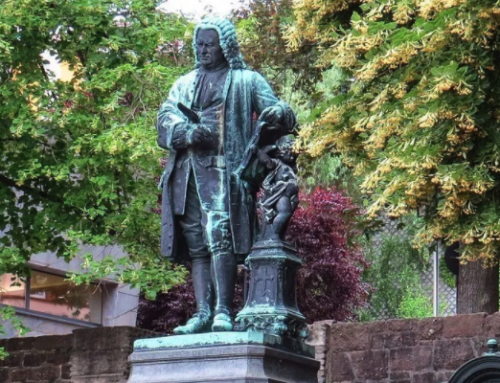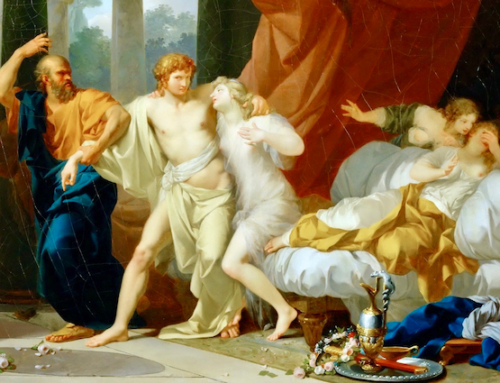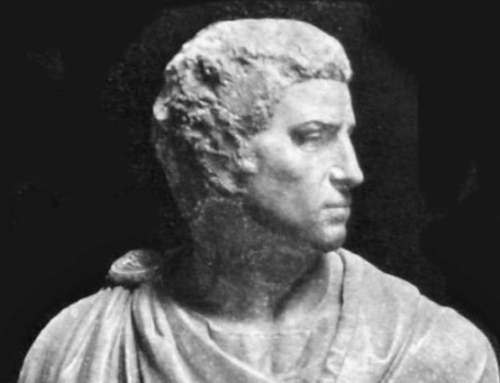 Can you tell me, Socrates, whether virtue can be taught? [to continue] Or if not teachable, is it acquired by practice, or if neither, whether men possess it by nature or in some other way?”
Can you tell me, Socrates, whether virtue can be taught? [to continue] Or if not teachable, is it acquired by practice, or if neither, whether men possess it by nature or in some other way?”
So begins Plato’s dialogue, Meno, opening as abruptly upon the reader as my remarks have upon you this afternoon. You freshmen will spend a good part of this year with Plato, his frustrating protagonist, Socrates, and this very dialogue, Meno, in both English translation and the original Greek. I think I am on relatively safe ground in saying that the reason we spend so much time on the Meno is that this dialogue belongs peculiarly to this college; it is deeply rooted here. I hope to expose a few of those roots this afternoon—but let me first return to the beginning.
“Tell me, Socrates, if you can, whether human excellence can be taught? If not, whether we can acquire it by practice? Or if neither of these, whether we are born with it or it comes to us in some other way?”
Meno’s question is interesting, for it appears to go to the heart of some very big questions all of us share: what does it mean to be human, and how can we be better human beings? Parents would love to know how to raise children who are improvements on themselves; all parents want what is best for their children. Teachers would be happy and honored above all others if they could teach their students human virtue. As for students—why else are you here but that you believe that some answer might be given to Meno’s question: What is the right path to virtue? How might I acquire human excellence?
But Meno’s question has its flaws. For one, it comes out of the blue and without context. We are supposed to know, somehow, what Meno is talking about. We’re assumed to have a common vocabulary and even a common understanding of basic concepts.
Speaking of vocabulary, some of you will have noted that I translated the Greek in two different ways when I repeated Meno’s question in English–an exercise you freshmen will undertake as you try first to discover what is being said and what it means, before asking whether it is true. Such attempts at translation will be first steps to get at the root of Meno’s question.
Socrates appreciates what is at stake in Meno’s question. He thus goes straight to the heart of it with a response that would confound any student hoping to receive the almighty truth from a teacher. Socrates in effect says: how can I say how virtue is acquired when I don’t even know what it is? And worse, Socrates then says that he’s never met any other person who knows what virtue is. He entreats Meno to help him understand what Meno thinks it to be. Meno makes the attempt, responding confidently with what he has heard from other teachers, repeating their opinions as his own. Yet, under Socrates’ questioning, Meno finds himself disowning the opinion he began with. After two false starts, Meno begins to get uncomfortable with Socrates’ examination. When Socrates begs him to start over yet a third time, Meno tries to divert the conversation from the question of virtue to the problem with Socrates:
Socrates, I certainly used to hear, even before meeting you, that you never do anything else than exist in a state of perplexity yourself and put others in a state of perplexity. And now you seem to me to be bewitching me and drugging me and simply subduing me with incantations, so that I come to be full of perplexity. And you seem to me, if it is even appropriate to make something of a joke, to be altogether, both in looks and in other respects, like the flat torpedo fish of the sea. For, indeed, it always makes anyone who approaches and touches it grow numb, and you seem to me now to have done that very sort of thing to me, making me numb. For truly, both in soul and in mouth, I am numb and have nothing with which I can answer you. And yet thousands of times I have made a great many speeches about virtue, and before many people, and done very well, in my own opinion anyway; yet now I’m altogether unable to say what it is.
It is beginning to look as if Meno has no interest in the answer to the question and is more concerned with his image or reputation than with the truth. On the other hand, Socrates is not satisfied; he still wants to proceed with the search for an answer. He is also willing to conduct the search with Meno, a man who seems to have no thoughts of his own. Socrates, in wishing to proceed, has done two things; he’s told Meno that he’ll serve as Meno’s teacher if Meno will let him—that is, that he will join Meno in the search; and he’s told the reader that he is willing to do so because he might actually learn something from Meno. He is truly open to the possibility that the teacher may learn from the student–any student, even Meno. So, Meno, what is virtue?
Meno now tries a sting of his own, challenging Socrates with a classic learner’s paradox: either we know something or we don’t. If we know it, we don’t need to search for it. But if we don’t already know what we’re looking for, how will we ever recognize it when we see it?
Socrates will not be deterred by Meno’s attempt to bring the conversation to an abrupt halt. Instead, he takes Meno’s problem seriously and answers in two ways. First, he repeats a myth he has heard which suggests that learning is a kind of recollection, which requires an exercise of responsibility for learning by the one doing the learning; learning does not occur when someone else, a teacher for example, tries to put knowledge into a student. Instead, it is an act of recovery, in some way, of something already known to us.
When Meno demonstrates that he doesn’t get it, Socrates resolves upon a way to show Meno what he means, asking Meno to observe carefully as he examines one of Meno’s slave boys about a problem in geometry which is new to him—a problem which can be demonstrated by a drawing in the earth—a problem, not incidentally, that you will be working on in your mathematics tutorial with Euclid. The slave boy reaches a point where he expresses with confidence an answer which is false—an answer which he, himself, a few moments later comes to understand is wrong under Socrates’ questioning. The slave boy tries again with the same result. Socrates asks him to start over, just as he did with Meno a little earlier. He asks the boy to produce another answer, and the slave boy says: “Indeed, Socrates, I do not know”.
Socrates turns to Meno, and by extension to us, and says:
Do you see, Meno, what advances he has made in his power of recollection? He did not know at first, and he does not know now, what is the : but then he thought that he knew, and answered confidently as if he knew, and had no difficulty; now he has difficulty, and neither knows nor fancies that he knows.
Meno: True
Socrates: Is he not better off knowing his ignorance?
Meno: I think that he is.
Socrates: If we have made him doubt, and given him the “torpedo’s shock,” have we done him any harm?
Meno: I think not.
Socrates: We have certainly, it would seem, assisted him in some degree to the discovery of the truth; and now he will wish to remedy his ignorance, but then he would have been ready to tell all the world again and again [the answer he gave at first?].
Meno: True.
Socrates persuades Meno that the slave boy simply would not have been ready to inquire and learn the truth without first being reduced to perplexity. The torpedo’s shock not only didn’t hurt, it positively helped; it was the condition for the learning that did occur (and the slave boy did go on, with Socrates’ help, to find the solution to the geometry problem).
Socrates has shown us, the readers (and Meno, if he were listening), that understanding our own ignorance is necessary for learning to take place–especially understanding our ignorance of the everyday common things we thought we knew well. When we can look at the familiar and suddenly realize that we really don’t understand it, when we can look at what we always thought we knew, and ask “what is this thing?” then we are ready to learn and well along the path to better understanding. In that state we are truly torpid, just as the slave boy was, and we bring a sense of “wonder” to our search. This wonder comes not from something we understand, but rather from our desire to understand—what we sometimes call a love of learning, born not in understanding but in ignorance.
Socrates has done something else in his demonstration. He has also shown us the power of discovering what something is NOT, and helped us see that knowing what something is not is much more than knowing nothing; it is a kind of “knowing ignorance,” an “intelligent perplexity” that comes from trying out and discarding false notions. He has also helped us see that we not only don’t know what virtue is, we don’t even know what learning is.
We now look at Meno and see that he is a slave…a slave to his pride, a slave to the opinions of others, unwilling to examine what he clearly doesn’t understand. Meno’s problem is not that he’s ignorant, but that he has no desire to be free from the shackles of that ignorance.
We look at the slave boy and see that he is free—free from the false notions he’s been carrying around with him, free from barriers to learning. This freedom, strangely, comes not from the certainty of knowledge but from the recognition of his ignorance.
Let me return to the place where I began, when I said that this dialogue of Plato’s is deeply rooted at the college. We want you to acquire the freedom of Meno’s slave boy, the freedom that allows you to acknowledge the one certainty in life: “Indeed, Socrates, I do not know.” Recognition of that certainty is the pathway to learning—learning things that will belong to you, not just repeating things that belong to others. We also want you to have practice with the tools you will need to acquire this freedom—tools that will help you to listen and to read attentively and deeply, to express yourselves intelligibly and precisely, and to measure and reckon the world in which you live accurately and comprehensively—tools that will help give shape to your understanding who you are and where you live, and what your responsibility is toward others and the world you together inhabit, the world of the body and the world of the spirit.
We live with a deep paradox at the College—one that you will confront right at the outset. We have made very deliberate choices about what should and should not be included in this all required curriculum (and there are many, many excellent works that are not on the program list simply because there’s no room for them in just four years). Yet we tell you that, for all the conviction we might have that these choices constitute the best undergraduate curriculum we can devise, this conviction is not grounded in the answers these books purport to give but in the questions they raise. When we say that this college is committed to radical inquiry, we mean inquiry into the very traditions and books that have shaped the world we’re born into. This is why we are not ashamed to admit that though we are called an institution of higher learning, we really do not know what learning is. We share the conviction, nonetheless, that it is worth the search to find out. When we welcome you to St. John’s College, we are welcoming you to join us in a search that we imagine will sustain all of us for all of our lives—a search for origins and foundations that will be firm enough to support the good life we each wish to live. We call on you to join us as fellow lovers of learning, not as a would-be scholars.
One of the things you will discover as you read the several platonic dialogues on the program is that they demand your engagement. They ask for you to reflect on how you might respond to Socrates. So, let me venture into the conversation of the Meno with a small, tentative reflection on the question Socrates puts to Meno: “what is virtue?” My thoughts, at least for now, are these: the way to virtue may require that we come to know our great weakness, our own ignorance. This ignorance is common to all who are less than divine; it is something we share with one another in our humanity. If there is a connection between knowledge and right conduct, it is likely to be found in our ignorance and in the humility it inspires, in seeing that every single one of us has a long, long way to go toward understanding, in the endless search for truth. I suspect that human virtue lies somehow coterminous with this strange path toward knowledge, a path through ignorance and therefore available to us all. As we are not likely to attain great heights of knowledge, it is more likely that we can share with each other the great peaks of desire. It may be that the love of learning, more than the attainment of understanding, is what binds us together most tightly. It may also be this love of learning which impels us to great acts of virtue, like the virtue we will be asking you to exhibit every day in class: helping your classmates to experience the loving sting of the torpedo fish, helping them see that you too have a lot of baggage to unload, and coming to see that learning is best pursued in a community of lovers of learning, each seeking what is best for the others.
And now I see that I’ve found my way to a typical difficulty experienced by all Socratic interlocutors. I’ve tried to say something about the nature of virtue, in terms of loving and learning, when I’m not sure I know what these are. So, let me leave you with this question: Tell me, freshmen, what is this love of learning that has brought you to our door, and where does it come from?—for I do not know, though I am happy in the thought that we have this much to share with each other for four full glorious years.
Welcome to St. John’s College! May you experience the sting of the torpedo fish early and often. May the sting never hurt, but help you along the path toward understanding and freedom.
Convocation Address to the Class of 2010.
The Imaginative Conservative applies the principle of appreciation to the discussion of culture and politics—we approach dialogue with magnanimity rather than with mere civility. Will you help us remain a refreshing oasis in the increasingly contentious arena of modern discourse? Please consider donating now.
The featured image is “Alcibades being taught by Socrates” (1776) by François-André Vincent (1746–1816) and is in the public domain, courtesy of Wikimedia Commons.







This is splendid! Thank you!
Excellent. I have felt the sting of the torpedo fish many times in my life & it has always led me into a better direction.